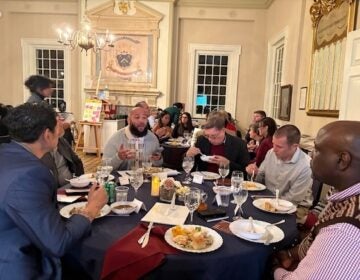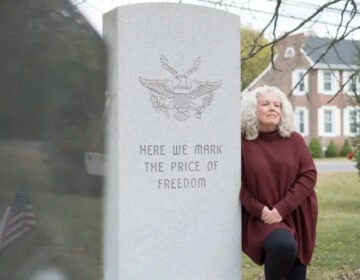Taking on a creative — and behind the scenes — role in theater
Production management is a special type of artistry, and it requires two outlets of creativity.

spotlights and reflections on a modern theater stage

Philadelphia favorite son and Grammy Award-winner Questlove has published “Creative Quest,” a collection of inspirational stories and lessons about living one’s best creative life. In this spirit, Speak Easy has asked Philadelphia artists to share stories of their own creative quests.
I began doing theater as a closeted middle-schooler, a very stereotypical story to say the least. Theater was a place I felt safe to express myself and feel like I fit in. When I came out in high school, theater continued to be a place where I was free to be myself without judgment. While I wasn’t always sure about that in the outside world, I felt unabashedly me on stage.
I continued to study theater and dance at Muhlenberg College in Allentown, mostly as a performer. As I approached graduation, I developed a stronger interest in directing as well as the production and design side of theater.
My first job out of college was as a performer in “The Velveteen Rabbit” a nationwide tour with Enchantment Theatre. As I saw more of the country and gained experience as a performer, I became more interested in design and the thought that I’d like to direct.
After the tour, I applied for several production apprenticeships as that seemed to be the route toward the creative outlet I was searching for in theater. I eventually figured out that production manager was my ideal role: Compared with a director, for example, I don’t have to come up with all the ideas. I just have to take the ideas and find creative ways to make them happen.
For eight years, I’ve served as a production manager for multiple companies including InterAct Theatre Company, Simpatico Theatre, Tribe of Fools, and Shakespeare in Clark Park.
Production management is a special type of artistry, and it requires two outlets of creativity.
Managing people calls for the knack of coordinating schedules, facilitating communication among all team members, and handling different personalities. You have to have a certain type of patience to deal with many people all at once and help serve as leader and assistant at the same time.
The second piece of artistry is creating the actual “art.” When working for smaller companies the production manager often helps fill in the gaps. I have become “jack of all trades, master of none” in theater design.
With each show I work on, I learn new tricks to help create stronger art on the next project. I’ve learned to program and focus lights; create playlists of music and sound cues through a program called QLab; stitch torn costumes; help repair and build sets.
At its true core, production management is really just creative problem solving. We find creative ways to make the vision of the show become a reality. At the very least, we help come up with a plan B when budget, time, or resources don’t allow the original idea to come to fruition. It takes creativity to guide multiple ideas into one cohesive product that brings in audiences night after night to the theater.
As a young production manager, I would met with seasoned pros: Courtney Rigger at the Arden, Clayton Tejada at the Wilma, and Tim Martin, who was then at the Lantern Theatre. I asked for advice on how to do my job better and make the process of bringing a play from page to stage a smoother process. They gave me tips on how to help foster a creative environment so artists can bring their vision to the stage.
They all truly inspired me to see that production management isn’t just about keeping people on deadlines and under budget. It’s also about helping use the resources at our disposal and exhausting all possibilities for an artistic idea before saying no.
I now serve as the managing director for 11th Hour Theatre Company, though I won’t personally serve as the production manager for “Big Red Sun” in June. I’m still behind the scenes trying to make sure our artists have all they need to bring the play to life. It takes a lot of creativity to make sure a show succeeds.
Our industry highlights the tangible optics — actors, directors, designers.
But some of the most talented people I know are the production managers, stage managers, and administrators who may not directly touch the art we see on stage. They make it possible, however, and they make sure people are in the audience to experience it. And that takes a lot of creativity.
WHYY is your source for fact-based, in-depth journalism and information. As a nonprofit organization, we rely on financial support from readers like you. Please give today.




